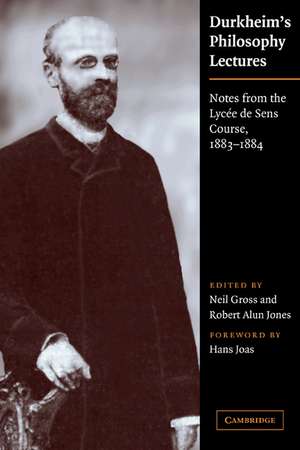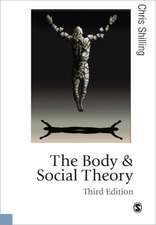Durkheim's Philosophy Lectures: Notes from the Lycée de Sens Course, 1883–1884
Autor Emile Durkheim Neil Gross, Robert Alun Jones Cuvânt înainte de Hans Joasen Limba Engleză Paperback – 27 apr 2011
| Toate formatele și edițiile | Preț | Express |
|---|---|---|
| Paperback (1) | 385.01 lei 6-8 săpt. | |
| Cambridge University Press – 27 apr 2011 | 385.01 lei 6-8 săpt. | |
| Hardback (1) | 755.87 lei 6-8 săpt. | |
| Cambridge University Press – 18 iul 2004 | 755.87 lei 6-8 săpt. |
Preț: 385.01 lei
Nou
Puncte Express: 578
Preț estimativ în valută:
73.67€ • 77.11$ • 61.32£
73.67€ • 77.11$ • 61.32£
Carte tipărită la comandă
Livrare economică 31 martie-14 aprilie
Preluare comenzi: 021 569.72.76
Specificații
ISBN-13: 9780521175425
ISBN-10: 0521175429
Pagini: 358
Dimensiuni: 152 x 229 x 20 mm
Greutate: 0.53 kg
Editura: Cambridge University Press
Colecția Cambridge University Press
Locul publicării:New York, United States
ISBN-10: 0521175429
Pagini: 358
Dimensiuni: 152 x 229 x 20 mm
Greutate: 0.53 kg
Editura: Cambridge University Press
Colecția Cambridge University Press
Locul publicării:New York, United States
Cuprins
Foreword; Translator's note; Acknowledgements; Introduction; Part I. Preliminary Matters: 1. The object and method of philosophy; 2. The object and method of philosophy (conclusion); 3. Science and philosophy; 4. The divisions of philosophy; Part II. Psychology: 5. The object and method of psychology; 6. Faculties of the soul; 7. On pleasure and pain; 8. The inclinations; 9. The emotions and passions; 10. Theory of knowledge; 11. External perception and its conditions. The senses; 12. External perception. The origin of the idea of externality; 13. External perception. On the objectivity of the idea of externality. (1) Does the external world exist?; 14. External perception. On the objectivity of the idea of externality. (2) On the nature of the external world; 15. Consciousness. On the conditions of consciousness; 16. Consciousness. On the origin of the idea of the self; 17. Consciousness. On the nature of the self; 18. Reason. The definition of reason; 19. Reason. The material of reason. (1) Principles; 20. Reason. The material of reason. (2) Rational or first ideas; 21. Reason. Empiricism; 22. Reason. Evolutionism. The theory of heredity; 23. Reason. On the objectivity of rational principles; 24. Faculties of conception. On the association of ideas; 25. Faculties of conception. Memory; 26. Faculties of conception. Imagination; 27. Faculties of conception. Sleep. Dreams. Madness; 28. Complex operations of the mind. Attention. Comparison. Abstraction; 29. Complex operations of the mind. Generalization. Judgment. Reasoning; 30. The object and method of aesthetics; 31. What is beauty; 32. Prettiness and the sublime. Art; 33. On activity in general. Instinct; 34. Habit; 35. On the will and on freedom; 36. On freedom (continued). Psychological determinism; 37. On freedom (conclusion). Scientific determinism. Theological fatalism. Part III. Logic: 38. Introduction. On logic; 39. On truth. On certainty; 40. On certainty (conclusion); 41. On false certainty of error; 42. Skepticism; 43. Ideas. Terms. Judgments. Propositions; 44. Definition; 45. On the syllogism; 46. On induction; 47. Fallacies; 48. On method; 49. Method in the mathematical sciences; 50. The methodology of the physical sciences; 51. Method in the natural sciences; 52. Method in the moral sciences; 53. Method in the historical sciences; 54. Language; Part IV. Ethics: 55. Definition and divisions of ethics; 56. On moral responsibility; 57. On moral law. The history of Utilitarianism; 58. Critique of Utilitarianism. The morality of sentiment; 59. The morality of Kant; 60. The moral law; 61. On duty and the good. On virtue. Rights; 62A. Division of practical ethics; 62B. Individual morality; 63. Domestic ethics; 64. Civic ethics; 65. General duties of social life; 66. General duties of social life. (1) The duty of justice; 67. General duties of social life. (2) Charity; 68. Summary of ethics; Part V. Metaphysics: 69. Metaphysics. Preliminary considerations; 70. On the soul and its existence; 71. On the spirituality of the soul (conclusion). On materialism; 72. The relationship between the soul and the body; 73. On the immortality of the soul; 74. On God. Metaphysical proofs of his existence; 75. Critique of metaphysical proofs of the existence of God; 76. Explanation and critique of the physiotheological proof; 77. Critique of the physiotheological proof (conclusion). Moral proofs and the existence of God; 78. The nature and attributes of God; 79. The relationship between God and the world. Dualism, pantheism, and creation; 80. The relationship between God and the world (conclusion). Providence, evil, optimism, and pessimism; Appendix: biographical glossary; Index.
Descriere
Emile Durkheim sets out to introduce students to the field of philosophy.

















